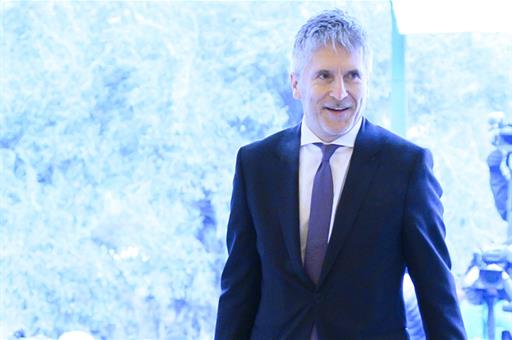Grande-Marlaska: "Experiences such as the Special Plan for the Campo de Gibraltar are an example for progress in the fight against organised crime in Europe"
News - 2022.10.7
The Minister for Home Affairs, Fernando Grande-Marlaska, jointly with his counterparts from Belgium, Germany, France, Italy and the Netherlands, has ratified Spain's commitment to strengthen the European Coalition against Organised Crime, which aims to work on developing cooperation tools to break up and dismantle the transnational networks woven by these organisations.
The meeting held in the Dutch capital was attended by the European Commissioner for Home Affairs, Ylva Johansson, the executive director of Europol, Catherine De Bolle, and the president of Eurojust, Ladislav Hamran, in addition to the home affairs ministers of the member countries and the justice ministers of Belgium and the Netherlands.
During the meeting, Grande Marlaska reiterated the new challenges we are facing, particularly those related to digital transformation, and shared the extensive experience of Spanish police forces in the fight against organised crime with his European colleagues.
In this regard, the minister highlighted the good results seen with initiatives such as the Special Security Plan for Campo de Gibraltar, which can serve as an example for future actions at a European level. "The results of the Special Plan for Campo de Gibraltar are indisputable. The number of investigations and arrests has increased and the pressure on the organisations established there has led to an appreciable change in the way they operate", Grande-Marlaska stressed.
Specifically, since the start of this special plan - on 1 August 2018, and with data until 30 April - the police activity deployed in the territories included in the Special Security Plan for Campo de Gibraltar has led to the arrest and investigation of more than 10,840 suspects and the seizure of more than 1,400 tonnes of drugs.
"We have managed to implement a comprehensive action that speeds up investigations thanks to greater human resources, the provision of technological resources and the creation of synergies between the different police, customs and judicial bodies, which makes it increasingly difficult for these criminal gangs to operate".
On the other hand, the Minister for Home Affairs also called for new technological tools to be developed that will allow access to the information handled by these groups via the internet: "By being stronger in the virtual world we will be able to follow the trail of illicit criminal finances. We need to make sure that crime is not profitable", the minister said.
Likewise, Grande-Marlaska advocated strengthening international cooperation, particularly with Latin America and the Caribbean, which he said would be one of Spain's priorities during Spain's Presidency of the EU in 2023.
Priorities of the Multi-annual Action Plan
The countries of the European Coalition against Organised Crime took a further step in Amsterdam and gave the green light to the new multi-annual action plan, which updates the priorities of the four action blocks adopted in 2021: logistical hubs and maritime security; the economic and financial dimension of organised crime; technological innovation and, finally, international cooperation. In addition to these four blocks, a generic operational needs block has been added.
The first block envisages the creation of a cooperation platform to increase the resilience of logistics hubs and prevent criminal infiltration, as well as removing legal and technical barriers on exchanging data on ship movements. In the economic and financial field, work will be done on the interconnection of national registers of bank accounts and EU rules for the recovery and freezing of assets being adopted, as well as preventive measures against money laundering and criminal investments, including virtual assets.
In terms of technological development, Coalition countries will promote new tools to support the effective investigation of criminal networks and assess the possibilities of exchanging data from automatic number plate recognition (ANPR). Finally, international cooperation will be strengthened, particularly with Latin America and the Western Balkans.
Non official translation





